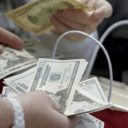

The Survey of Consumers preliminary reading on consumer sentiment shows a rebound in confidence, beating the high end of the forecast range.
The Index of Consumer Sentiment came in at 95.5, higher than the 93.0 consensus forecast. Economic forecasts ranged from a low of 90.0 to a high of 94.5.

Current Economic Conditions remained elevated at 110.0, but declined from 108.8 in January. The Index of Consumer Expectations rebounded significantly from 79.9 to 86.2.
The early February gains reflect the end of the partial government shutdown as well as a more fundamental shift in consumer expectations due to the Fed’s pause in raising interest rates. The lingering impact of the shutdown was responsible for some of the negative economic evaluations, and, at the time that these interviews were conducted, uncertainty about whether a second shutdown would occur continued to have a slight depressing impact on confidence. Although the majority of consumers expected some additional rate hikes during the year ahead, that proportion has shrunk to the smallest level in the past two years. Perhaps more importantly, consumers’ long term inflation expectations fell to the lowest level recorded in the past half century. While nominal income expectations remained at modest levels, consumers more frequently expected gains in their inflation-adjusted incomes in early February than at any other time in more than fifteen years (see the chart). The data indicate that personal consumption expenditures will remain the strongest sector in the national economy in 2019–up by 2.7% compared with a GDP gain of 2.2%. The data suggest that the Fed will find it even harder to justify another rate hike given the record low inflation expectations; the data will also add to the debate about the evolving relationship between unemployment and inflation as consumers now anticipate lower inflation and higher unemployment.
Richard Curtain, Chief Economist for Survey of Consumers






